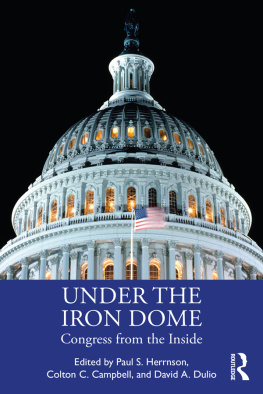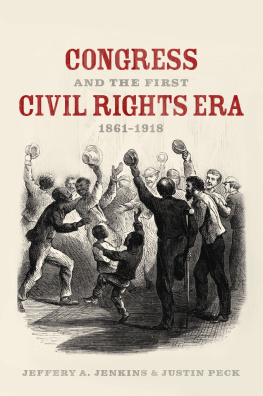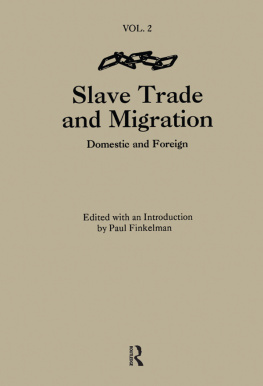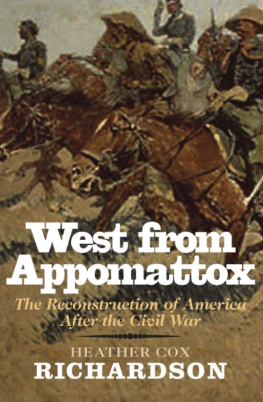Perspectives on the History of Congress, 18011877
Donald R. Kennon, Series Editor
Congress and the Emergence of Sectionalism: From the Missouri Compromise to the Age of Jackson, edited by Paul Finkelman and Donald R. Kennon
In the Shadow of Freedom: The Politics of Slavery in the National Capital, edited by Paul Finkelman and Donald R. Kennon
Congress and the Crisis of the 1850s, edited by Paul Finkelman and Donald R. Kennon
Lincoln, Congress, and Emancipation, edited by Paul Finkelman and Donald R. Kennon
Congress and the Peoples Contest: The Conduct of the Civil War, edited by Paul Finkelman and Donald R. Kennon
Civil War Congress and the Creation of Modern America: A Revolution on the Home Front, edited by Paul Finkelman and Donald R. Kennon
Ohio University Press, Athens, Ohio 45701
ohioswallow.com
2018 by Ohio University Press
All rights reserved
To obtain permission to quote, reprint, or otherwise reproduce or distribute material from Ohio University Press publications, please contact our rights and permissions department at (740) 593-1154 or (740) 593-4536 (fax).
Printed in the United States of America
Ohio University Press books are printed on acid-free paper

28 27 26 25 24 23 22 21 20 19 18 5 4 3 2 1
Hardcover ISBN: 978-0-8214-2338-7
Electronic ISBN: 978-0-8214-4645-4
Library of Congress Cataloging-in-publication data available upon request.
Paul Finkelman
Introduction
The Congress, the Civil War, and the Making of Modern America
THE CIVIL WAR remains the central moment of American history. The ordeal by fire kept the Union together at the cost of some 630,000 deaths by bullets, disease, exposure, and the horrid conditions in both United States and Confederate prisoner of war camps. It was not merely Americas bloodiest war, but as bloody as all other American wars combined. Wounded and maimed veterans came home bearing the outward scars of battle and carrying inner scars.
Our memory of the Civil War is mostly about warfare and battles, the carnage made glorious and meaningful by emancipation. Certainly the central meaning of the war is national unity and national freedom, followed by a critical (although incomplete) restructuring of the Constitution and the nature of the national government. But as the essays in this volume show, the war changed the nation in other ways as well. Indeed, beyond emancipation and the constitutional changes of the Thirteenth, Fourteenth, and Fifteenth amendments, the war permanently altered the American nation. The war forced Congress to expand the size of the government beyond anything imaginable before 1861. At the same time, the absence of senators and representatives from most of the slave states enabled Congress to pass legislation that allowed for internal improvements, expanded foreign policy initiatives, stimulated western settlement, and supported the general welfare of the nation. Southerners had blocked such laws, arguing that they helped the North and the free states, threatened slavery, harmed the South, or overly expanded the national government.
The war effort fundamentally and permanently changed the nation in many ways. About two million Northern men served in the United States Army and Navy during the war. reversing seven decades of discrimination and ultimately paving the way for black suffrage on the same basis as whites. Its immediate consequence was to alter Northern society, especially in black communities, as tens of thousands of African American men enlisted.
The recruitment and movement of troops affected daily life in many places. As Guy Gugliotta notes, Housing in wartime Washington was at a premium. Living conditions were crowded and stressful. Civility had all but disappeared as people routinely dumped garbage in the vacant lot[s] and unruly children threw rocks at windows. The nations capital was filled with civil servants, politicians, contractors, fugitive slaves, tens of thousands of soldiers, and all manner of other people. In the summer of 1862 Congress ended slavery in the District of Columbia, which dramatically altered
In March 1863 Congress more dramatically altered American culture and society by establishing the nations first system of military conscription. Conscription was a major change in American policy and national culture. Military service was no longer tied to patriotism and a desire to serve the nation. It was now becoming mandatory. In her essay Conscription and the Consolidation of Federal Power during the Civil War, Jennifer L. Weber outlines the mechanics of conscription, noting that the law resulted in a tectonic shift in the relationship between federal and state governments and between the nation and its people. Indeed, much of this book tracks this theme, as we see the exigencies of war giving Congress powers it never would have imagined using before the war.
Similarly, the sheer magnitude of the warthe expense in blood and treasureforced other changes. The war effort required a vast industrial expansionthe war transformed the nation from one that was overwhelmingly agricultural to one that was increasingly industrial. While there were factories and some industry in the North before 1861, the war was the engine that truly brought the Industrial Revolution to the United States. In addition to the obvious expansion of the production of military hardware, the nation had to produce vast quantities of preserved and canned food, boots, uniforms, bugles, drums, saddles and reins, and other equipment and accoutrements. Nonmilitary industrial production that was used for the war effort, such as rails for train tracks, engines for trains, and wire for telegraph lines, further changed and modernized the nation by creating new jobs, new factories, investments, and profits.
Similarly, the war cost money. Paying for the war was enormously complicated, as Jenny Bourne shows in To Slip the Surly Bonds of States Rights and Form a More Perfect (Financial) Union: One Legacy of the Thirty-Seventh Congress. Among other things, the war led Congress to pass the nations first income tax and to print paper money for the first time since the Revolution. As Bourne notes: Congress resorted to innovative schemes, including the first-ever income tax, widespread use of fiat money issued via newly created national banks, massive amounts of government borrowing, and debt sold directly to the public. The war allowed Congress to remake the national economy, in part because of necessity. Secession also made it possible. With the demise of the Bank of the United States in the 1830s, opposition to national economic policyand even a national currencyhad been a mantra of the Democratic Party, which usually controlled Congress and the White House in this period. We live under a tax system created by the war.










